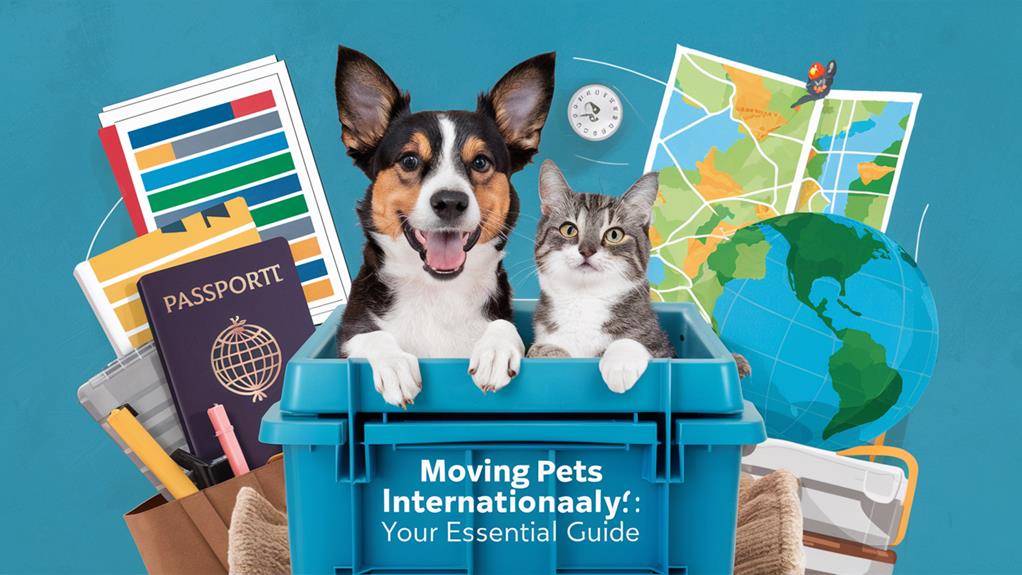Moving pets internationally involves careful preparation and attention to regulations. First, you'll need a pet passport that includes health records, vaccination details, and an import permit. Microchipping your pet is often required, and be sure to check the specific vaccination needs for your destination, especially for rabies. It's essential to choose a comfortable carrier for travel and pack familiar items to reduce anxiety. Costs can vary widely, from $2,000 to over $7,500, depending on documentation and health checks. Using expert pet movers can simplify the process. There's much more to consider as you plan your pet's journey.
Pet Passport and Documentation
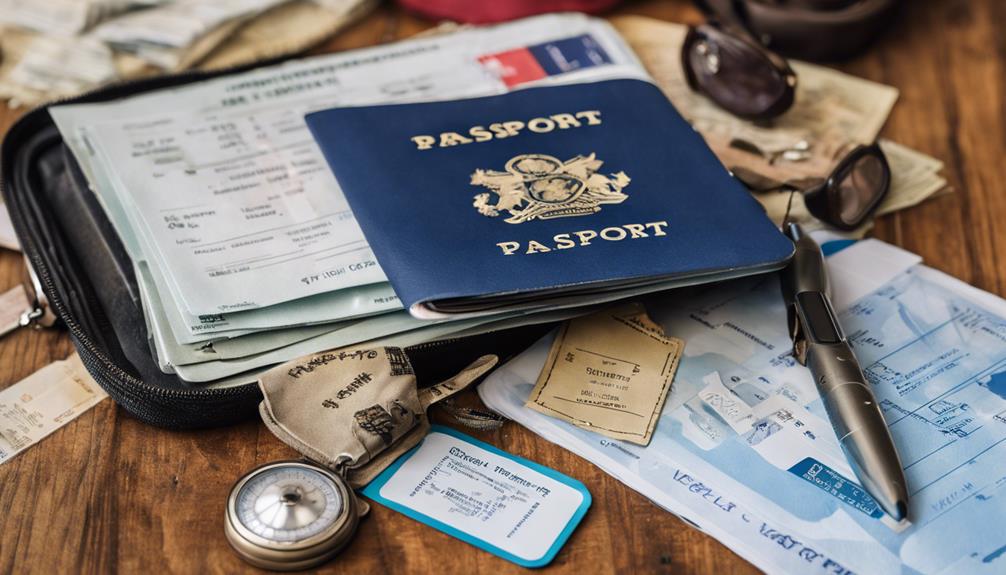
When moving pets internationally, you'll often need a pet passport and proper documentation to ensure a smooth journey. A pet passport includes key information, such as your pet's description, your details, health status, and vaccination records.
Most countries require an import permit and a health certificate endorsed by the USDA-APHIS, which confirms that your pet meets the destination country's health and vaccination standards.
Before traveling, microchip implantation is often mandatory, and you'll need to ensure the microchip complies with ISO standards for identification.
Vaccination records are crucial, especially for rabies. In some cases, a rabies titer test may be required to verify your pet's immunity levels. This test measures the antibodies in your pet's blood, confirming they're protected against rabies.
It's vital to gather all necessary documentation well in advance. Incomplete documentation can lead to quarantine or refusal of entry, so double-check everything.
Travel Comfort for Pets
When traveling with your pet, choosing the right carrier crate is crucial for their comfort and safety.
Include familiar items, like a t-shirt with your scent, to help ease their anxiety during the journey.
It's also important to plan for their hydration and nutrition, ensuring they've water available and food packed for long flights.
Carrier Crate Selection
Choosing the right carrier crate for your pet is essential for ensuring their comfort during international travel. When considering your carrier crate selection, make sure it meets International Air Transport Association (IATA) regulations, which dictate size and ventilation.
A travel-approved crate should allow your pet enough space to stand, turn around, and lie down comfortably, which is vital for their overall well-being during transit. Additionally, ensure that your pet is familiarized with the crate well in advance, as pre-move preparation can significantly ease their transition.
To help your pet acclimate to travel, introduce them to the crate well before your departure. Familiarizing them with the travel crate can significantly reduce anxiety, making the journey smoother for both of you. Additionally, securing a water dish to the crate door is crucial, as pets won't have access to food or water during the flight.
While we won't cover familiar items in this section, remember that comfort is key. A well-chosen carrier crate not only meets regulations but also prioritizes pet comfort, helping to ease stress and promote a more enjoyable travel experience.
Familiar Items Inclusion
Including familiar items in your pet's travel crate can make a world of difference during international journeys. These items, like a piece of your clothing or your pet's favorite blanket, can significantly reduce anxiety and provide comfort.
When pets have access to familiar items during travel, they feel more secure, helping to minimize stress responses in unfamiliar environments.
To ensure your pet's well-being, introduce them to their travel crate with these familiar items well in advance of the trip. This practice encourages positive associations, making the crate feel like a safe space.
A favorite toy or blanket can be especially comforting during long flights or extended periods of confinement, allowing your pet to relax.
Hydration and Nutrition
Keeping your pet hydrated and well-nourished during international travel is crucial for their comfort and health. Before departure, fill their water bowls in the crates to ensure they've access to hydration, as they won't receive food or water during the flight.
It's best to feed your pets no later than six hours before the trip, helping to prevent nausea and ensuring their comfort.
To make hydration easier during layovers or delays, attach a water dish to the crate door. For long flights, pack familiar food and snacks, which will maintain their nutrition and help minimize travel stress.
Bringing food they recognize can encourage them to eat, making the journey more pleasant.
Additionally, consider including familiar scents, like a t-shirt you've worn. This can ease anxiety and stimulate your pets to drink and eat during the travel.
By prioritizing hydration and nutrition, you can enhance your pet's travel experience, helping them feel more secure and comfortable in unfamiliar environments.
Understanding Costs of Relocation
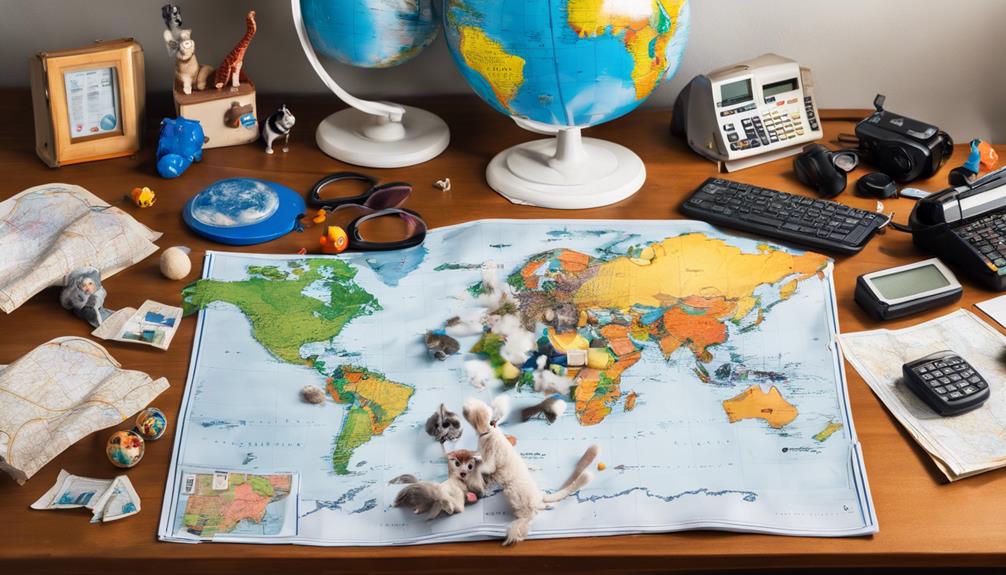
When you're planning to relocate your pet internationally, understanding the costs involved is essential.
You might find that expenses can range from $2,000 to $7,500 or more, depending on your destination, your pet's size, and necessary documentation fees.
Additionally, budgeting for unexpected costs, like emergency vet visits or last-minute changes, will help ensure a smoother relocation process.
Estimated Relocation Expenses
Relocating your pet internationally can cost anywhere from $2,000 to over $7,500, depending on factors like size, weight, transport method, and distance traveled. Major expenses typically include documentation, health checks, carrier crates, vaccinations, and travel amenities, which can exceed the cost of human travel.
If you choose to use pet relocation services, it's essential to understand the estimated costs involved.
For pets traveling as cargo, expect higher rates, particularly for larger pets over 100 lbs. These costs can include additional fees for health checks and necessary vaccinations. Quarantine fees may also come into play, depending on your destination country.
You should budget for unforeseen expenses, such as emergency health checks or last-minute changes in travel plans or regulations.
To effectively manage overall relocation costs, compare quotes from various pet relocation services. By doing so, you can find the best options that fit your needs.
Budgeting for Unexpected Costs
As you prepare for your pet's international move, it's important to recognize that unexpected costs can arise at any stage of the process. Budgeting for unexpected costs is essential to avoid financial surprises, especially since average long-distance move costs can vary widely.
While estimates for relocating pets range from $2,000 to $7,500, hidden expenses can inflate this figure. For instance, health certificates and additional services, like those provided by a professional pet relocation company, may not be included in your initial quote.
Understanding moving costs can help you identify potential areas for additional expenses.
Consider the transport method you'll use, as this can significantly impact costs. If there are potential quarantine fees or extra health checks required by your destination country, you'll want to factor those into your budget as well.
Additionally, currency exchange fees and costs associated with international payments can add up quickly.
Planning for emergencies, such as changes in travel regulations or flight cancellations, is also crucial. These unexpected delays can lead to increased expenses, so it's wise to have a financial cushion.
Essential Documentation Fees
Navigating the essential documentation fees for pet relocation can be daunting, with costs typically ranging from a few hundred to several thousand dollars.
To ensure a smooth international pet relocation, you'll need to consider several key fees. First, health certificates are often required by importing countries, and they may need to be endorsed by USDA-APHIS, which can add to your expenses.
You should also prepare vaccination records, especially for rabies. In some cases, a rabies titer test may be necessary, further increasing your costs. Microchipping is another common requirement for international travel, with costs typically ranging from $20 to $100.
Additionally, be aware that quarantine fees can arise, depending on your destination country's regulations. These fees can vary significantly based on local laws, so it's wise to consult with a pet relocation specialist to understand what you might face.
Expert Help for Pet Moves
When you're planning an international move with your pet, expert help can make all the difference. Navigating the complexities of pet relocation isn't easy, but hiring professional services simplifies the process.
Expert pet movers, like Petraveller, offer door-to-door assistance, ensuring your pet's safe journey from health checks to customs clearance.
Here are three key benefits of using expert help for your pet's move:
- Compliance with Import Regulations: Professional pet relocation companies stay updated on the ever-changing import regulations, so you won't have to worry about paperwork mistakes.
- Transportation Logistics: Skilled movers manage all logistics, from scheduling flights to securing the best travel arrangements with airlines, reducing stress for both you and your pet.
- Avoiding Costly Mistakes: Engaging an expert can save time and prevent issues like quarantine or denied entry, which can occur due to improper documentation.
Airline Policies for Pet Travel
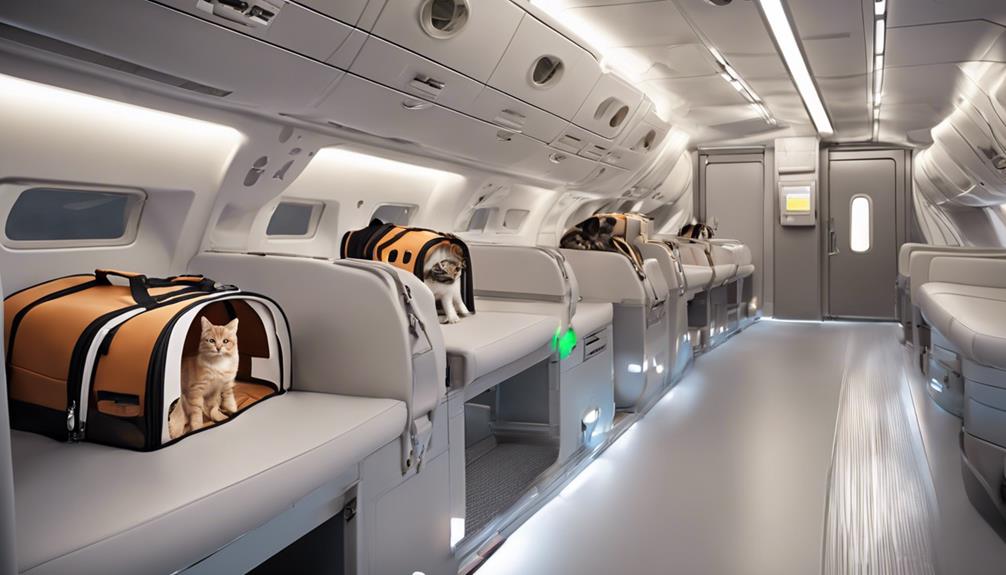
Airline policies for pet travel can vary significantly, so it's essential to familiarize yourself with the specific rules of your chosen airline before booking. Many airlines have specific policies regarding pet transport, including limitations on in-cabin pets and cargo travel.
Generally, in-cabin pets must weigh around 15-20 lbs, including their carrier. Be sure to measure your pet and carrier to comply with these restrictions.
Before you travel, you'll likely need a health certificate issued by a veterinarian within the last 10 days. This document confirms your pet's health status and is crucial for smooth travel.
Direct flights are preferred because they reduce stress for your pet, avoiding the complications that come with layovers, especially if your pet is traveling in cargo.
Temperature restrictions are also important to consider. Some airlines won't allow pet travel during extreme weather conditions. This policy is in place to ensure your pet's safety and well-being.
Always check the specific airline policies for your pet ahead of time, as this preparation can make a big difference in their travel experience.
Health and Safety Regulations
Traveling with your pet involves more than just booking a flight; you also need to understand the health and safety regulations that come into play.
These regulations are essential for ensuring your pet's safe and smooth journey. To help you navigate the process, here are three key aspects to consider:
- Health Certificates: Most countries require you to obtain a USDA-endorsed health certificate for your pet before travel. This document confirms that your pet is healthy enough to travel.
- Vaccination Requirements: You must check the specific vaccination requirements for your destination. Many countries require up-to-date vaccinations, especially for rabies, to protect both your pet and local wildlife.
- Microchip and Testing: An ISO-compliant microchip is often necessary for identification. Additionally, some destinations may require a rabies titer blood test to verify your pet has adequate rabies antibody levels.
Additionally, be aware that some countries impose quarantine periods upon arrival, which can vary based on your pet's vaccination history and country of origin.
Understanding these health and safety regulations will help ensure a successful international journey for you and your pet.
Preparing Pets for Travel
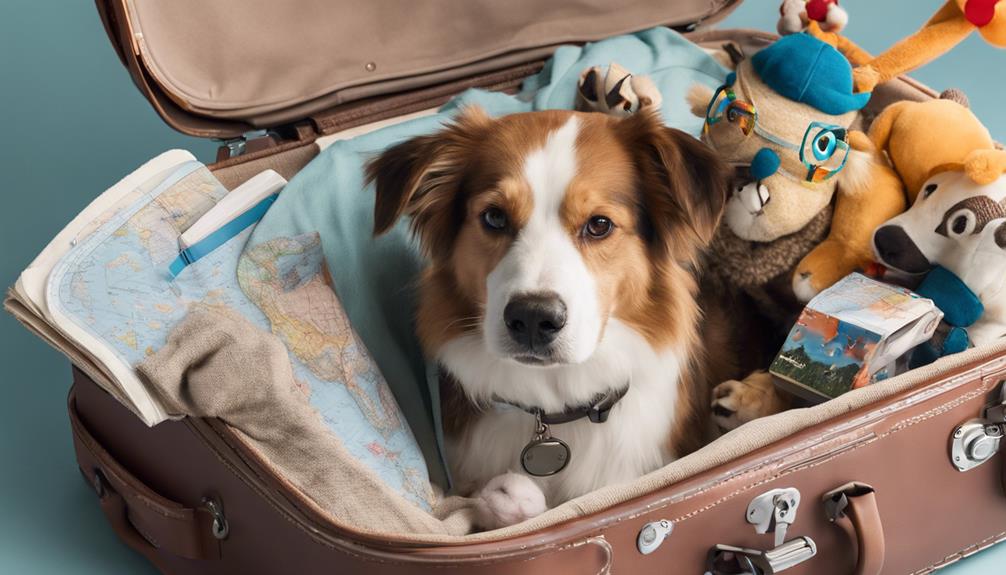
Preparing your pet for international travel requires careful planning and organization to ensure a smooth journey. First, schedule a vet visit to obtain health certificates and make sure your pet's vaccinations, especially rabies, are up to date.
Remember, requirements vary from country to country, so it's essential to research the specific regulations for your destination. This includes understanding necessary documentation, health certifications, and any potential quarantine protocols.
Microchipping your pet is often a must for importation, and using ISO-compliant microchips ensures they meet international standards. Acclimating your pet to travel-approved crates well in advance helps reduce anxiety and ensures comfort during transit.
Before you embark on moving overseas, double-check that all documentation, including health certificates and vaccination records, is complete and compliant with your destination's regulations.
Any missing paperwork can lead to complications upon entry, which you'll want to avoid. When moving your pet, attention to these details will help create a positive travel experience.
Resources for Pet Relocation
Once you've ensured your pet is ready for the journey ahead, leveraging the right resources can make the relocation process smoother. Understanding the various aspects of pet relocation and international regulations is crucial for a successful move.
Here are some valuable resources to consider:
- Professional Pet Relocation Companies: Companies like Petraveller offer tailored services that include document management and transport arrangements, ensuring compliance with import requirements.
- Government Resources: Websites like USDA-APHIS provide essential details on health certificates, vaccinations, and microchip requirements for pets entering different countries. This information is vital for keeping your pet safe and compliant.
- Community Forums: Online groups for expats can be incredibly helpful. They offer insights and shared experiences about relocating pets overseas, helping you navigate challenges and find local services.
Conclusion
Moving pets internationally can be a complex process, but with the right preparation, it can go smoothly. You'll need to gather the necessary documentation, understand airline policies, and ensure your pet's comfort during travel. It's also wise to consider costs and seek expert help if needed. By staying informed and organized, you can make this transition easier for both you and your furry friend, ensuring a safe and happy relocation experience for your pet.
